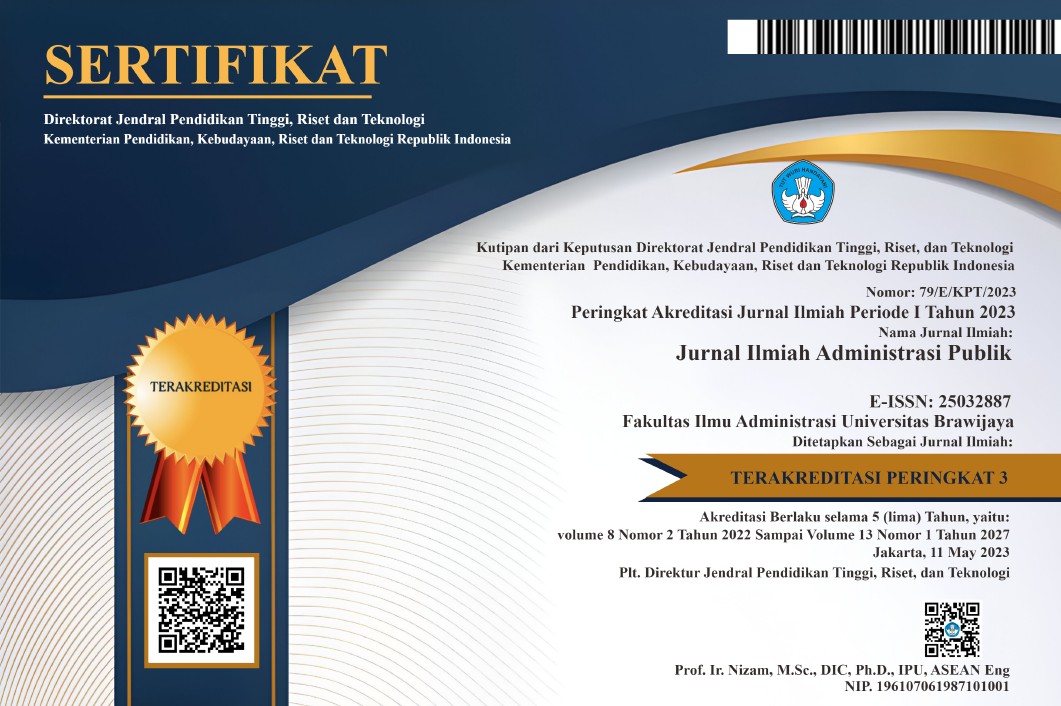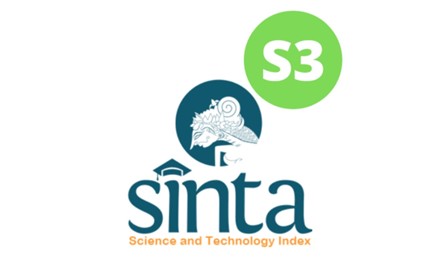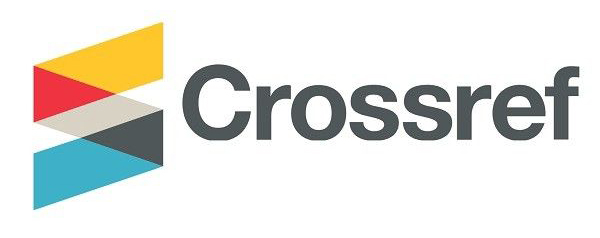Roles of Actors in Palm Oil Value Chain: a Paradox
DOI:
https://doi.org/10.21776/ub.jiap.2019.005.02.14Keywords:
Palm oil Value Chain, smallholders, welfareAbstract
Process of globalization has added pressure to smallholder palm oil in world palm oil producers countries. The globalization, however, create opportunities for small palm oil holders to benefit from it whenever they are able to collaborate proportionally with other actors. In order to do so, this study is aimed to elaborate the current value chain and typology of smallholders to establish the suitable collaboration schema. The finding showed that although there is imperfect quality of role, the variety of actors involved make smallholders found a better role. The PTPN VIII Kertayaja (State-Owned Enterprises (SOE) should be able to gain benefit and opportunities from suggestion use of the collaboration with other actors within the value chain. However, it is the role of SOE that act as state fiscal-revenue collector as well as maintaining status quo and having coercive power but it makes them complacent it and neglect to achieve sustainability role in empowering farmers. On the other hand, willingness to maximize the benefits created from the transaction has led head of village, private enterprises, collectors, sellers and transporters to find the most innovative way to help the small plantation owner to ease the challenges and maximize their roles in adding value to the chain.
References
Bates, Robert. H. (2001). Prosperity and Violence: The Political Economy of Development. New York: Norton.
Belcher, Brian., Rujehan., Ndan Imang., & Achdiawan, Ramadhani. (2004). Rattan, Rubber, or Oil Palm: Cultural and Financial Considerations for Farmers in Kalimantan. Economic Botany, Vol. 58, No. 1, pp.77-87.
Brandi, Clara A., Cabani, Tobia., & Hosang Cristoph. (2015). Sustainability Standards for Palm Oil: Challenges for Smallholder Certification Under the RSPO. The Journal of Environment & Development, Vol. 24, No. 3 (Juli 2015), pp. 1-26.
Casson A. (2000). The Hesitant Boom: Indonesia’s Oil Palm Sub-Sector in An Era of Economic Crisis and Political Change. Occasional paper No. 29. Bogor, Indonesia: CIFOR.
Charitonenko, Stephanie., & Afwan, Ismah. (2003). Commercialization of Microfinance: Indonesia. Manila, Philippines: Asian Development Bank.
Coe, Neil M., Dicken, Peter., & Hess, Martin. (2008). Global Production Networks: Realizing The Potential. Journal of Economic Geography, Vol. 8, No. 3, pp.271–295.
Cramb, R., & McCarthy, J. F. (2016). The Oil Palm Complex: Smallholders, Agribusiness and The State in Indonesia and Malaysia. Singapore: NUS Press.
DJP. (2015). Statistik Perkebunan Indonesia Komoditas Kelapa Sawit 2014-2016. Directorate General of Estate Crops, Jakarta.
Enrici, Ashley., & Hubacek, Klaus. (2016). Business as usual in Indonesia: governance factors effecting the acceleration of the deforestation rate after the introduction of REDD+. Energy, Ecology and Environment, Vol. 1, Issue 4, pp.183-196.
Eriksen, S.S. (2005). The Politics of State Formation: Contradictions and Conditions of Possibility. The European Journal of Development Research, Vol. 17, No. 3, pp.396-410.
Euler, Michael., Hoffman, Munir., Fathoni, Zakki., & Schwarse, Stefan. (2016). Exploring Yield Gaps in Smallholder Oil Palm Production Systems in Eastern Sumatra, Indonesia. Agricultural Systems, Vol. 146, pp.111-119.
Fan S., Brzeska, J., Keyzer, M., & Halsema, A. (2013). From Subsistence to Profit, Transforming Smallholder Farms. Washington DC: IFRI.
Fold, N. (2008). Transnational Sourcing Practices in Ghana's Perennial Crop Sectors. Journal of Agrarian Change, Vol. 8, No. 1, pp.94-122.
Gereffi, Gary., Humphrey, John., & Sturgeon, Timothy. (2005). The Governance of Global Value Chains. Review of International Political, Vol. 12, No. 1, pp. 78-104.
Grabowski, Richard., & Self, Sharmistha. (2006). Agricultural Development, State Effectiveness and Long-Run Economic Development. Discussion Papers, Paper 45. OpenSIUC (Southern Illinois University Carbondale), US.
Hidayat, Nia Kurniawati., Glasbergen, Pieter., & Offermans, Astrid. (2015). Sustainability Certification and Palm Oil Smallholders' Livelihood: A Comparison between Scheme Smallholders and Independent Smallholders in Indonesia. International Food and Agribusiness Management Review, Vol. 18, Issue 3, pp.25-48.
Humphrey, J., & Schmitz, H. (2002). How Does Insertion in Global Value Chains Affect Upgrading in Industrial Clusters?. Regional Studies, Vol. 36, No. 9, pp.1017-1027.
Lee Joonkoo., Gereffi, Gary., & Beauvais, Janet. (2012). Global Value Chains and Agrifood Standards: Challenges and Possibilities for Smallholders in Developing Countries. Proc Natl Acad Sci USA, 31 Jul 2012, pp.12326–12331.
Lee, Janice Ser Huay., Ghazoul, Jaboury., Obidzinski, Krystof., & Koh, Lian Pin. (2013). Oil Palm Smallholder Yields and Incomes Constrained by Harvesting Practices and Type of Smallholder Management in Indonesia. Agronomy for Sustainable Development, Vol. 34, No. 2, pp.501-513.
Lowder, Sarah K., Skoet, Jakob., & Raney, Terri. (2016). he Number, Size, and Distribution of Farms, Smallholder Farms,and Family Farms Worldwide. World Development, Vol. 87, pp.16–29.
Mann, Michael. (1988). States, War and Capitalism: Studies in Political Sociology. US: Blackwell.
Matin, Imran., Hulme, David., & Rutherford, Stuart. (2002). Finance for the Poor: From Microcredit to Microfinancial Services. Journal of International Development , Vol. 14, No. 2, pp.273-294.
McCarthy JF., Gillespie P., & Zen Z. (2012). Swimming Upstream: Local Indonesian Production Networks in “Globalized†Palm Oil Production. World Development, Vol. 40, No. 3, pp.555-569.
McCullough E., Pingali, P.L., & Stamoulis, K.G. (2008). The Transformation of Agri-food Systems: Globalization, Supply Chains and Smallholder Farmers. London & Sterling, VA: FAO and EarthScan.
Moore, M. (2004). Revenues, State Formation, and The Quality of Governance in Developing Countries. International Political Science Review, Vol. 25, No. 3, pp.297-319.
Obidzinski, Krystof., Takahashi, Ikukho., & Dermawan, Ahmad. (2013). Can Large Scale Land Acquisition for Agro-Development in Indonesia be Managed Sustainably?. Land Use Policy, Vol. 30, No. 1, pp.952-965.
Paspi. (2017). The Myths Vs Facts of Indonesia's Palm Oil Industry in Social, Economic and Global Environmental Issues. Bogor: Palm Oil Agribusiness Strategic Policy Institute.
Pempel, T.J. (1997). Regime Shift: Japanese Politics in a Changing World Economy. Journal of Japanese Studies, Vol. 23, No. 2, pp.333-361.
Pirard, Romain., Fishman, Akiva., Gnych, Sophia., Obidzinski, Krystof., & Pacheco, Pablo. Eforestation - Free Commitments: The Challenge of Implementation – An Application to Indonesia. Working Paper. Center for International Forestry Research (CIFOR), Bogor.
Rietberg, Petra., & Slingerland, Maja. (2016). Barriers to Smallholder RSPO Certification- A Science-for-Policy Paper by the SEnSOR Programme. Wageningen, the Netherlands: Wageningen University.
Ross, M. L. (2004). Does Tax Lead to Representation?. British Journal of Political Science, Vol. 34, pp.229-249.
Tilly, C. (1975). The Formation of National States in Western Europe. Princeton University Press, New Jersey.
Varkkey, Helena. (2016). The Haze Problem in Southeast Asia: Palm Oil and Patronage. London & New York: Routhledge.
Vermeulen, Sonja., & Cotula, Lorenzo. (2010). Making the Most of Agricultural Investment: A Survey of Business Models that Provide Opportunities for Smallholders. FAO & IIED, Rome, Italy.
Vogel, D. (2008). Private Global Business Regulation. Annuual Review Political Science, Vol. 11, pp.261-282.
Zen, Zahari., Barlow, Colin., & Gondowarsito, Ria. (2005). Oil Palm in Indonesian Socio-Economic Improvement A Review of Options. Available at https://ccep.crawford.anu.edu.au/acde/publications/publish/papers/wp2005/wp-econ-2005-11.pdf [Accessed on 10 January 2019].
Downloads
Published
Issue
Section
License
If your paper is accepted, the author identified as the formal corresponding author for the paper will receive an email prompting them to login into Author Services; where via the JIAP Author Licensing Service they will be able to complete the license agreement on behalf of all authors on the paper.














